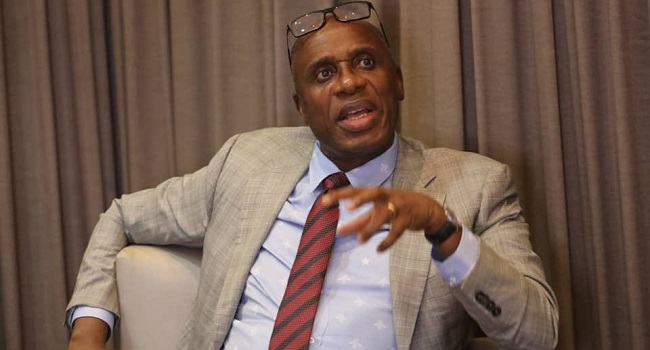The political crisis in Rivers State has taken a new turn following allegations by former governor Rotimi Amaechi that the ongoing feud between the suspended governor of the state, Siminalayi Fubara, and the Minister of the Federal Capital Territory, Nyesom Wike, is primarily about the sharing of state resources.
Amaechi made this assertion during an interview with Deutsche Welle (DW) today, where he claimed that financial interests are at the heart of the bitter conflict that has dominated political discussions in the oil-rich state.
Allegations of Financial Dispute
“The fight between the current governor of Rivers State and the FCT minister is about sharing money. If not, what is the quarrel?” Amaechi questioned, “Nigerians don’t dislike corruption anymore. I’ve not seen anybody on the street querying what the problem is. Can both of them speak to the public and tell us what the problem is about?”
His comments have further intensified the political debate surrounding the crisis, raising concerns about governance in Rivers State and the role of political elites in the allocation and control of resources.
Background of the Crisis
The dispute between Fubara and Wike has been brewing for months, with several political analysts attributing it to a power struggle between the two.
Wike, who served as Rivers State governor from 2015 to 2023 before being appointed as the FCT Minister by President Bola Tinubu, was instrumental in Fubara’s emergence as governor.
However, their relationship quickly soured over control of political structures and governance in the state.
The rift escalated in late 2023 when members of the Rivers State House of Assembly, believed to be loyal to Wike, initiated moves to impeach Fubara.
This was followed by intense political maneuvering, with some lawmakers defecting and others pledging allegiance to either faction.
The situation reached a climax when Fubara was suspended from office, further deepening the state’s political instability.
State of Emergency Controversy
Amaechi also criticized the emergency rule imposed on the state by President Bola Tinubu, calling it unconstitutional. He argued that such a drastic measure undermines democracy and fails to address the root causes of the crisis.
“The emergency rule imposed on Rivers State is not constitutional. It is an attempt to manipulate the system rather than find a real solution,” he said.
The decision to impose emergency rule had been met with mixed reactions, with some seeing it as a necessary step to restore order while others perceived it as an excessive intervention by the federal government.
Public Reaction and Political Implications
Amaechi’s claims have sparked widespread debate among political stakeholders and the general public.
Some residents of Rivers State have expressed disappointment over the allegations, stating that if the conflict is indeed about financial interests, then governance in the state is being driven by personal gains rather than public service.
A political analyst, Dr. Chinedu Eze, noted that the ongoing feud could have serious implications for governance and development in the state.
“If the crisis persists, it will stall projects and policies that should benefit the people of Rivers State. The battle for control between these two powerful figures is already distracting from governance,” he said.
On the other hand, some political observers argue that the feud is more than just about money, suggesting that it is part of a broader struggle for political dominance in the South-South region ahead of the 2027 elections.
Wike, who remains an influential figure in the Peoples Democratic Party (PDP), has been positioning himself as a key player in national politics. At the same time, Fubara seeks to assert his independence as the state’s chief executive.
Calls for Resolution
Amid the tension, various stakeholders, including traditional rulers and civil society organizations, have called for a peaceful resolution.
The Nigerian Governors Forum has also urged both parties to prioritize the interests of the Rivers people and avoid actions that could further destabilize the state.

